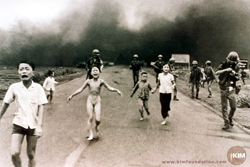The people of North Avenue Presbyterian Church here have a passion for mission.
That passion was nearly palpable when about 300 of them gathered Feb. 21 for the second week of the church’s 53rd annual mission conference. Worship began with a compelling visual affirmation of the conference theme as the faces and voices of North Avenue, in all their diversity, claimed:
Every day I will worship … grow … go.
This night was about growing. And the speaker was an expert.
The world first met Kim Phuc in June of 1972 when a picture taken by Associated Press photographer Nick Ut changed both her life and the way the world sees war.
The picture, of course, was the iconic shot of a little girl running, naked and screaming, from the napalm bombs rocking her village.
Ironically, it was Ut, after capturing the image on film, who scooped up the screaming 9 year old and rushed her to a South Vietnamese hospital. She was not expected to live. Two of her cousins died of their injuries. Her village, and the “happy, laughing” life she knew, were gone.
When her parents found her three days after the bombing, Kim was “in the death room — left to die — no more hope.”
“A kind doctor transferred me to a clinic in Saigon where I got treatment and survived to be with you today,” she said, beaming.
“I don’t want to talk a lot about suffering,” said the woman who endured 14 months in the hospital and a total of 17 surgeries and still experiences pain and health challenges. “Inside me there was a strong little girl determined to live!”
Instead she spoke of her journey and what she had learned.
Supervised constantly by the Vietnamese government, forced to appear in propaganda films, and made to leave school, Kim was a “national symbol of war.” In 1986 she had the opportunity to study in Cuba, where she met and married Bui Huy Toan. Kim had to abandon her studies once again, this time for ongoing health issues, and the couple defected to Canada while returning from their honeymoon in Moscow.
Her account of the journey sounds much like a thriller novel. With minutes to spare, during a one-hour stop to refuel in Newfoundland, Kim quickly told her new husband of the plan she had been making and then handed their passports to immigration officials who responded, “Welcome to Canada!”
Canadian citizens now, Kim and Toan, a local pastor, live in Toronto with their sons, Thomas and Stephen.
Quoting frequently from scripture, Kim told of the many things she has learned since the day the picture was taken. They have not been easy lessons.
She used to imagine her heart, which she describes as being filled with bitterness, sorrow and pain, as a picture of a black coffee cup. Knowing that she could not heal herself, Kim prayed, asking God to do something with that cup.
“Little by little,” she says, “bit of that cup was poured out every day until it was empty and God refilled it with love, light, joy, compassion, peace and forgiveness.”
And then she began to speak of the “last lesson” she learned.
“When we moved to Toronto,” she said, “I wanted to hide from that picture. It had controlled me for so long.”
One day a photographer from London recognized Kim on the street and, using a long lens, took her picture.
“Suddenly I was in the paper again. The picture did not want to let me go,” she said.
“I realized,” she continued, “that I couldn’t erase that picture, but I could work with it for peace. I could accept it as a powerful gift — as God’s plan for my life. Working with it for good is my choice. The picture was a symbol of war, but my life can be a symbol of peace and hope.”
Today Kim is living out that choice through the Kim Phuc Foundation, which she began to help child victims of war wherever they are found. The foundation is providing health care, schooling and clean water in Africa and other war-torn regions.
Kim speaks of her mission around the world, helping others to see that, “If we want to heal the world we have to start with the children. We can heal the future.”
As the picture flashed once again on the screen, Kim said, “I’m so grateful for that picture … the little girl is not running anymore. She’s flying.”
The mission conference, which began Feb. 14 with Columbia Theological Seminary President Steve Hayner speaking about worship, concludes on Feb. 28 as North Avenue pastor the Rev. Scott Weimer recalls how Jesus was sent into the world and the ways in which Christians are sent today.

